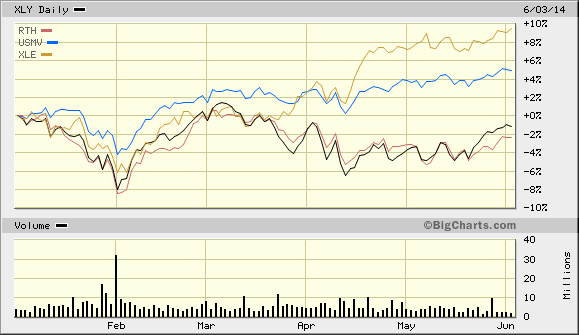Technology was the best performing sector in the five years prior to the 2000-2002 stock market bear. The acceleration of dot-com mania created a boom-to-bust scenario that few had ever seen. Yet “tech” actually weakened before other segments of the economy. What’s more, corporate shares of technology companies witnessed far more violent sell-offs than stock shares of other sectors.
Financial corporations led the bull market advance in the five years prior to the 2007-2009 collapse. Questionable underwriting practices fueled a frantic housing balloon. Banks and insurers that had been runaway performers in the uptrend suddenly began to reverse their direction. Indeed, the financial sector actually buckled months in advance of other sectors. Eventually, the drag of financials overwhelmed stocks from every other segment.
The recent past demonstrates that human beings often become too enamored too easily. Investors in the late 1990s were willing to pay exorbitant prices for any company with ties to the Internet, irrespective of revenue and profitability. In the 2000s, people were willing to do anything to acquire property, even if the property cost 40% more to own than to rent.
Granted, the last two bear markets punished the irrational exuberance of individuals as well as entities. It happened in “tech.” It happened to lenders and insurers. However, is there any reason to believe that a single sector has gotten so far out of whack that the 2009-2014 bull market might be jeopardized?
If there is a “bubble” this time around, one would have to take a look at consumer credit. Some folks believe that the record levels of credit used to acquire non-investment products and services is an indication of confidence. Others feel that stagnation in wage growth coupled with the rapid decline of workers in the workforce is a signal of an unhealthy reliance on credit.
I agree with the latter.
The central bank of the United States (a.k.a. “the Federal Reserve”) has been successful in persuading Americans to borrow and spend at exceptionally low interest rates. In fact, the best performing stock sector over the last five years is the consumer discretionary segment. SPDR Select Consumer Discretionary (ARCA:XLY) is up roughly 194%, far outpacing the next closest performer, SPDR Select Sector Industrials (ARCA:XLI) at 155% and SPDR S&P 500 Trust (ARCA:SPY), up 125%.
Indeed, consumer discretionary has led the way in the current bull market. And the increase in consumer credit has had a whole lot to do with it. The question is, would a slide in consumer discretionary share prices be as onerous as the slumps in the aforementioned sector stars (i.e., technology, financials, etc.)?
Probably not.
The consumer may be over-leveraged. And consumers may already be pulling back on their purchases. After all, if middle class Americans were genuinely feeling good about the direction of the economy, you would not see so many retailers (e.g., Wal-Mart (NYSE:WMT), PetSmart (NASDAQ:PETM), Home Depot (NYSE:HD), Lowe's (NYSE:LOW), Staples (NASDAQ:SPLS), etc.) struggling to generate revenue. While one could make the case that tapped-out consumers could foreshadow a recession and/or bear market in stocks, it would be quite the leap to claim that a “consumer discretionary bubble” will shock the S&P for a 50% catastrophe.
Again, U.S. consumers have been relying too heavily on credit for their purchases. And ultra-low rates may be encouraging the activity. That said, investors can steer around any immediate icebergs by avoiding ETFs like SPDR Select Consumer Discretionary (XLY) and Market Vectors Retail (NYSE:RTH).
Whether the smart money is exiting XLY due to overvaluation concerns, fears of a consumer credit bubble, or business cycle rotation, the money is moving just the same. Energy (SPDR Energy Select Sector Fund (ARCA:XLE)) typically performs well in the latter stages of a business cycle and it is outperforming most sector funds today. I would attribute some of that outperformance to investors revisiting the emerging market growth story. If you’re not a big fan of sector investing, you may want to consider participating in equities via a low volatility investment. For instance, iShares USA Minimum Volatility (NYSE:USMV) may not rocket ahead in a raging bull market, but it holds its own nicely during periods of uncertainty.
Disclosure: Gary Gordon, MS, CFP is the president of Pacific Park Financial, Inc., a Registered Investment Adviser with the SEC. Gary Gordon, Pacific Park Financial, Inc, and/or its clients may hold positions in the ETFs, mutual funds, and/or any investment asset mentioned above. The commentary does not constitute individualized investment advice. The opinions offered herein are not personalized recommendations to buy, sell or hold securities. At times, issuers of exchange-traded products compensate Pacific Park Financial, Inc. or its subsidiaries for advertising at the ETF Expert web site. ETF Expert content is created independently of any advertising relationships.

